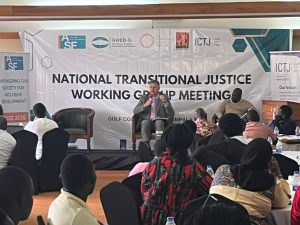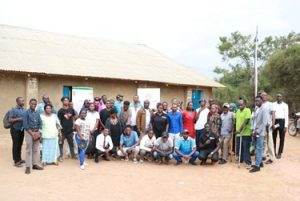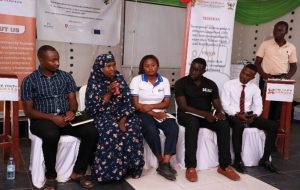Murugo Justice Project
 The Murugo Justice Project is an initiative by Mazungumzo aimed at reimagining justice for those often left out of the mainstream systems. Survivors of armed conflict, refugees and intersex persons from the Great Lakes region living in Uganda.
The Murugo Justice Project is an initiative by Mazungumzo aimed at reimagining justice for those often left out of the mainstream systems. Survivors of armed conflict, refugees and intersex persons from the Great Lakes region living in Uganda.
A lot happens during times of civil and political unrest. In the aftermath of these, many seek for answers, justice and closure. To some, understanding past events is a critical step to healing and forgiving perpetrators. The effects of war are always devastating as many lives, property, families, dreams and hopes are lost as survivors live through these realities as their new normal. Knowledge that wrong has been put to right and that perpetrators of wrong shall never have the power to repeat the same action or inaction goes a long way in feeding the soul and mind with peace. Arguably, this process can only be done through an efficient and acceptable justice system.
 The project acknowledges the urgent need for justice to not only be efficient, but also inclusive especially for intersex individuals, whose experiences are frequently misunderstood or erased within social, political and cultural conversations. For them, justice means being seen, respected and integrated into systems that affirm their identity and rights. The project further promotes a collective responsibility among actors in the Great Lakes region to ensure that justice mechanisms reflect the diverse needs of the people they serve.
The project acknowledges the urgent need for justice to not only be efficient, but also inclusive especially for intersex individuals, whose experiences are frequently misunderstood or erased within social, political and cultural conversations. For them, justice means being seen, respected and integrated into systems that affirm their identity and rights. The project further promotes a collective responsibility among actors in the Great Lakes region to ensure that justice mechanisms reflect the diverse needs of the people they serve.
Justice at its most basic level is simply about dealing fairly with the wrong doings of the past. However, the conventional system of justice attracts a lot of mistrust due to its seemingly detached effect on people. These systems tend to prioritize retribution over reconciliation, leaving marginalized communities further alienated. Okot P’Bitek, in Song of Lawino, poetically critiques how foreign concepts of justice, imposed upon the Acholi people, felt like the ways of ghosts—alien, elitist, and disconnected from local understanding. This is because the formal justice mechanisms and system seem foreign to local understanding and perhaps too elitist such as the ways of foreigners.
Similarly, it is crucial to recognize intersex persons as a uniquely marginalised group whose voices have been drowned in the larger social, cultural, and political dynamics of Uganda. Amid a deeply homophobic environment, intersex individuals are frequently misunderstood, misrepresented, and treated unjustly, their lived realities overshadowed by stereotypes, stigma and illiteracy regarding the subject. For intersex persons, justice is not merely about retribution but about recognition, inclusion and access to systems that affirm their dignity and address the structural inequalities they face. An inclusive justice system must amplify their voices, address their unique vulnerabilities and provide spaces for social inclusion and representation. By doing so, we move closer to a justice framework that is not only efficient but also equitable and reflective of the lived realities of marginalized groups, including intersex persons.
While the meaning of Justice is a contested one, the project will seek to understand the justice needs of the different societies of interest to it. To this end, such facets of Justice such as traditional justice, transitional, restorative and the formal court system are areas of particular interest of this project.
